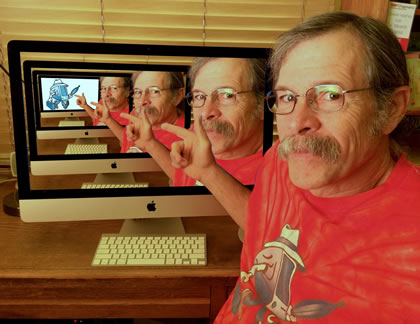
Episode #667
November 13, 2021
A computer consultant can seldom answer the question “Why?”
Troubleshooting is an art which can uncover a problem, but may not reveal a cause.
i have always used the troubleshooting method of split half analysis to determine WHAT the problem might be.
Split half is the process of eliminating everything except the problem.
“The sculpture is already complete within the marble block, before I start my work. It is already there, I just have to chisel away the superfluous material.”
— Michelangelo Buonarroti
A problem exists inside its environment. Removing the filters that obscure the problem is the key to discovering the problem.
“I see, ye can not see the wood for trees.”
—1546 J. HEYWOOD Prov. II. iv. (1867)
Not seeing the forest for the trees means you are so focused on the details that you cannot see the big picture.
“When you have eliminated all which is impossible, then whatever remains, however improbable, must be the truth.”
— Sherlock Holmes / Arthur Conan Doyle
Divide the problem in half and discard the less likely half. Divide what remains and repeat until the problem is all that remains.
Once the nature of a problem is revealed the problem can be addressed and likely resolved.
Still, i may not know what caused the problem in the first place.
There are many unknown variables contributing to the “Why.”
“There are known knowns… We also know there are known unknowns… But there are also unknown unknowns… Well, of course you don’t know what you don’t know.”
—Donald Rumsfeld
The cause of a problem is not often useful in solving the problem.
It is important, however, if you do not want to repeat it.
i am often asked why a computer problem occurred.
Questions i might ask to answer the question of “why” are:
“What were you doing when the problem occurred?”
“What other applications were running when the problem happened?”
“When was the last time you quit the malfunctioning application?”
“When was the last time you shut down the computer?”
“Is all your software up-to-date?”
As you can imagine, the answers to most of these questions are typically unknown to the user.
The lesson here is to pay attention to EVERYTHING that is happening in the environment you are in.
When driving a car you watch the road.
When skydiving, your head is always on a swivel.
When using a computer you observe the entire forest as you are looking at the trees.
Know what the system is doing while you are using one of its components.
WHY? is a big question, often deserving of little or no attention.
i took a test in a high school philosophy class.
The test was only one question.
“WHY?”
The more that the student wrote the lower the grade they received.
The second highest grade was awarded to the answer:
“BECAUSE.”
The highest scoring answer was:
“WHY NOT?”




The Dunning Kruger syndrome seems to be one of those diagnoses which,
is becoming increasingly prevalent…
https://en.wikipedia.org/wiki/Dunning%E2%80%93Kruger_effect#:~:text=The%20Dunning%E2%80%93Kruger%20effect%20is,task%20underestimate%20their%20own%20ability.
An interesting take on my post David. i don’t disagree. The syndrome states that “low ability people do not possess the skills needed to recognize their own incompetence.” i prefer to think of my less than fully aware clients are under informed.
Rick,
I always enjoy your blog, even those that are WAY over my head. Is your IQ 160+ or what????
You said “what???”. Did you mean “Why???”
A true renaissance man. I look forward to you sharing your thoughts each Friday. Going to forward this to my granddaughter at MIT. This will evoke a heated discussion: should be interesting.
I love the quotes and theories in this post. As a computer programmer, I found the most fun in debugging and often using the cut in half method and of course the eliminate the impossible method.
When confronted with a problem by a client, I am frequently asked why it happened. My standard response has become: “I am a lot better at fixing things than I am at explaining why they happened. And if you had to make a choice between getting it fixed and understanding why it happened, which would you choose?”